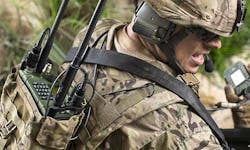Harris wins contract to provide Special Operations forces with new manpack radio
The new manpack radio will have an open-systems architecture to enable periodic hardware, firmware, operating software, and radio waveform upgrades.
Officials of Special Operations Command (SOCOM) at MacDill Air Force Base, Fla., announced a potential $255 million six-year contract Monday to the Harris RF Communications segment in Rochester, N.Y., to provide the Special Operations Forces Tactical Communications Next Generation Manpack (STC NGMP) Radio system.
The new radios will replace SOCOM's current radio communications equipment like the AN/PRC-117F and PRC 117G multiband multimission radios, as well as the AN/PRC-150 multiband radio.
Related: Harris to provide military Special Operations radios for sensitive and covert missions
The new radios also will enable Special Operations forces to receive and distribute intelligence, surveillance, and reconnaissance data in the form of full motion video, and support simultaneous dual-channel line-of-sight, and beyond-line-of-sight operation using legacy, and advanced digital radio waveforms.
SOCOM experts are asking Harris to provide a radio with National Security Agency (NSA) and Joint Interoperability Test Command (JITC) certifications, and make the new communications system available for purchase no later than June 2018.
The new radio will be capable of simultaneous two-channel operation with each channel able to support narrowband and wideband waveforms simultaneously while receiving intelligence, surveillance, and reconnaissance (ISR) data in full-motion video as an embedded capability or via an attached mission module.
The STC NGMP will be able to crossband data from one of its two channels to the other and from the ISR receiver to either of the two radio channels, as well as include an embedded selective availability anti-spoofing module (SAASM) Global Positioning System (GPS) receiver.
SOCOM is asking for capabilities like the Demand Assigned Multiple Access (DAMA) integrated waveform (IW) for UHF satellite communications (SATCOM), Mobile User Objective System (MOUS), general purpose narrowband and wideband high frequency (HF) waveforms, advanced special communications modes (ASCM) and electronic counter-countermeasures (ECCM) waveforms.
Harris also will provide program and configuration management, systems engineering to include software, logistics support, operational and depot-level maintenance, data, and training.
On this contract Harris will do most of the work in Rochester, N.Y., and should be finished by June 2023. For more information contact Harris RF Communications online at www.harris.com, or U.S. Special Operations Command at www.socom.mil.
Learn more: search the Aerospace & Defense Buyer's Guide for companies, new products, press releases, and videos

